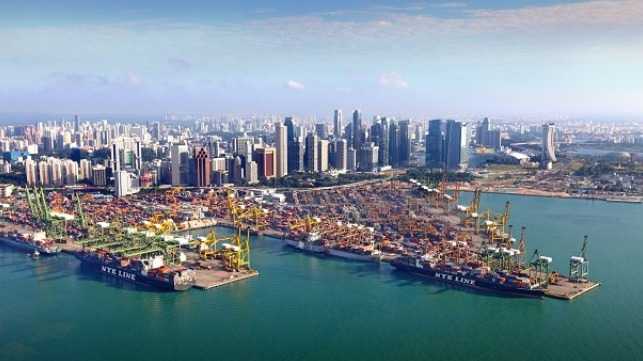ABS Launches Study of Ammonia as a Marine Fuel at Port of Singapore

The American Bureau of Shipping is working with Nanyang Technological University (NTU Singapore) and the Ammonia Safety and Training Institute (ASTI) on a study of the potential for ammonia bunkering at the port of Singapore. The study will explore supply, bunkering, and safety challenges with the future marine fuel.
“Ammonia is a fuel with significant potential for marine applications and ABS is leading the way in understanding challenges in the safe design and operation of ammonia-fueled vessels. It is also clear that Singapore has the potential to play a critical role as a strategic downstream location to receive, store, consume or bunker ammonia,” said Panos Koutsourakis, ABS Director of Sustainability Strategy.
ExxonMobil, Hoegh LNG, MAN Energy Solutions Singapore, Jurong Port, PSA Singapore and Japanese trading house Itochu Group are initial project partners, and are contributing technical information about marine fuel handling, vessel to vessel transfer and bunkering at the port.

that matters most
Get the latest maritime news delivered to your inbox daily.
Itochu has previously announced a partnership with terminal operator Vopak to study the supply chain for an ammonia bunkering hub at Singapore. Itochu is also a partner in a Japanese project to develop ammonia-powered ships, in partnership with Mitsui, MAN, Imabari Shipbuilding and ClassNK.
“Ammonia is a key potential marine fuel. We look forward to working together with ABS and ASTI, in a collaboration supported by the Singapore Maritime Institute, to jointly deepen the understanding on various aspects of ammonia’s maritime applications. The research effort is in tune with Singapore’s long-term maritime decarbonization strategy," said Professor Jasmine Lam Siu Lee, the director of the Maritime Energy & Sustainable Development Centre of Excellence at NTU Singapore.
The deployment of green ammonia as a marine fuel still requires considerable R&D. MAN is developing an ammonia-fueled two-stroke engine, and it plans to field its first working model by 2024. Wärtsilä is working with Eidesvik Offshore to trial an ammonia-powered fuel cell aboard the offshore supply ship Viking Energy, with first operations planned for 2023.
